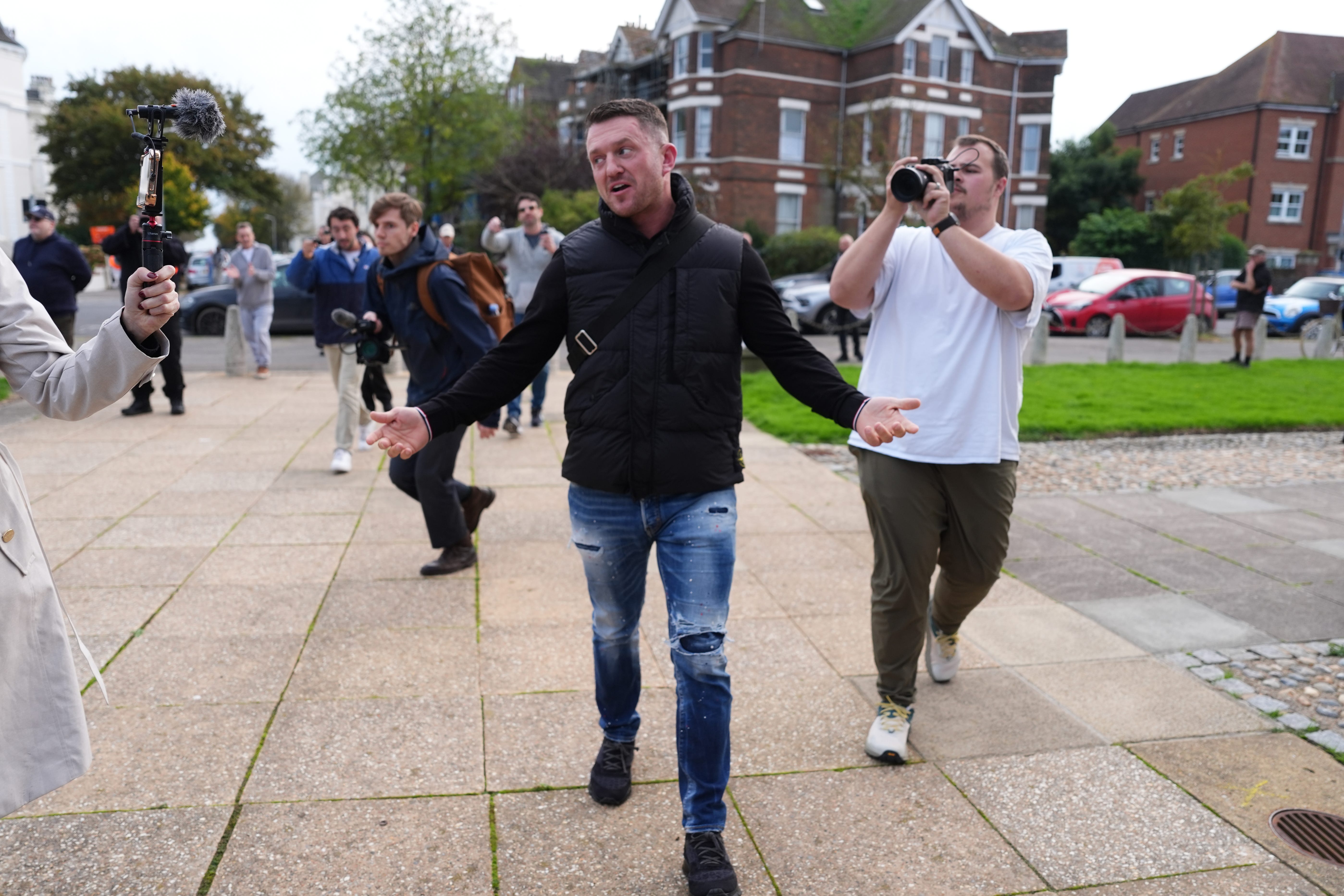Tommy Robinson to miss planned protest after being remanded into custody
The 41-year-old, whose real name is Stephen Yaxley-Lennon, is accused of being in contempt of court.

Political activist Tommy Robinson will miss his own planned march for thousands of people after being remanded into custody by police.
The 41-year-old, whose real name is Stephen Yaxley-Lennon, is accused of being in contempt of court following the airing of a film at a protest in central London.
He attended Folkestone Police station on Friday where he was separately charged with failing to provide his mobile phone Pin to police under Schedule 7 of the Terrorism Act 2000, Kent Police said.
Robinson is due to appear at Woolwich Crown Court on Monday for a two-day hearing concerning allegations he breached a 2021 High Court order barring him from repeating libellous allegations against a Syrian refugee who successfully sued him.
It is understood the airing of a film, titled Silenced, at a demonstration in Trafalgar Square in July is one of six actions claimed to have breached the injunction between June and July this year.
The film is also pinned to the top of his X, formerly Twitter, account.
Supporters of Robinson are due to hold a demonstration on Saturday, which is expected to be met with a counter-protest organised by Stand Up to Racism.
The Metropolitan Police and British Transport Police are due to be supported by officers from other forces across the country as the Met said there will be a “significant police presence” to ensure the two groups are kept apart.
The PA news agency understands Robinson will be held in custody in Folkestone until his court hearing on Monday.
He was released on unconditional bail in July and subsequently left the country, with Adam Payter, representing the Solicitor General, telling the High Court there “was nothing to prevent him from doing so”.
Mr Justice Johnson issued a warrant for Robinson’s arrest but ordered that it not be carried out “until early October” to allow Robinson time to indicate that he would attend the next hearing voluntarily or to apply to “set aside” the warrant.
Robinson posted a video of himself arriving at Luton Airport on October 20 and said he was surprised he had not been arrested.
The activist applied to set aside the warrant but his application was dismissed by Mr Justice Johnson on Friday.
Kent Police said Robinson was separately charged with an offence under the Terrorism Act, and he was bailed in relation to that matter.
It follows his arrest in July at a port in Kent where he was accused of “frustration” of police counter-terrorism powers.
He has now been charged under Schedule 7 of the Terrorism Act 2000 after allegedly failing to provide his mobile phone Pin to officers at the Channel Tunnel in Folkestone.
Under Schedule 7 of the Terrorism Act, police are allowed to stop anyone passing through a UK port “to determine whether they may be involved or concerned in the commission, preparation or instigation of acts of terrorism”.
The person who is detained can be held for up to six hours, is legally obliged to answer questions and must provide the password or Pin for electronic devices, or be held to have committed a criminal offence if they refuse.
Robinson said he objected to a request from police for the Pin to his phone because there was privileged information on the device relating to an ongoing High Court case.
On Saturday, the protest organised by Robinson is due to march from Victoria station to the southern end of Whitehall, while the counter-protest organised by Stand up to Racism will begin at Regent Street St James’s and finish at the north end of Whitehall.
The Met said static rallies are expected at the end of both marches.
Deputy Assistant Commissioner Rachel Williams, who is leading the policing operation, said: “We are well prepared for what is set to be a busy day in the centre of London.
“Our role is to ensure that those attending the various events can do so safely and that they can exercise their right to lawful protest.
“We will have significant resources in place to respond to any incidents, to deal decisively with any offences, and to keep disruption to other members of the public and businesses to a minimum.
“We know that when groups with opposing views come together it can lead to conflict and disorder, and a key part of our role is ensuring that does not happen.
“We have used Public Order Act conditions to ensure that those involved stick to routes and assembly areas that are sufficiently far apart. Officers will be monitoring closely to ensure that conditions are adhered to.”
Ms Williams continued: “The impact of frequent significant protest in central London is considerable, not least on the officers deployed to police them.
“Many would be working in other frontline roles if they weren’t required for these events.
“We’re grateful for the assistance of colleagues from other forces whose contribution means we are able to police protests while also keeping local communities across London safe.”
Bookmark popover
Removed from bookmarks